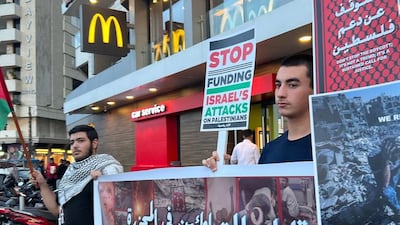Live updates: Follow the latest news on Israel-Gaza
Arabs across the region are boycotting western businesses, particularly American ones, reflecting anger over their perceived support for Israel in the Gaza war.
Disillusionment with the West, much of which has offered unconditional support to the right-wing government of Benjamin Netanyahu and its actions in Gaza, is also a factor in this movement.
The boycott has, over the little time it has been in force, picked up pace.
Outlets of brands such as Starbucks, McDonald's and Domino's Pizza sit empty or are lightly frequented in Arab cities such as Cairo, Amman, Beirut, Kuwait and Doha, indicating the depth of anger felt by many Arabs over the war.
It is harder to ascertain the effect the boycott has had on popular US products such as Pepsi and Coca-Cola, although a top regional executive from one of the two global brands told The National that stocks held by local distributors have increased in past weeks.
former sales executive for a US IT company
In some cases, he said, local employees have quit their jobs in protest.
“It may not be a game-changer and it may not last long enough to inflict serious damage, but it drives the point home that we, like the Israelis, are human beings whose lives matter just as much,” said Hany, a former sales executive in a US IT company.
Scenes coming out of Gaza showing small children killed or wounded in Israeli air strikes; or the helplessness painted on the faces of tens of thousands walking to supposedly safer parts of the Gaza Strip to escape Israeli bombardment, has left many angry.
Israel's relentless bombardment of Gaza since October 7 has killed more than 11,000 people, including at least 4,000 children, according to the Health Ministry in Gaza. It has also displaced about half the coastal enclave's 2.3 million residents and wiped out entire blocks in urban areas.
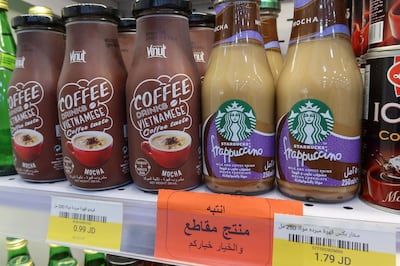
The bombardment is in response to a deadly rampage in southern Israel by Hamas militants that killed about 1,400 people. Israeli strikes have been branded as a “collective punishment” and a breach of international law by several Arab leaders.
More recently, Israel's aerial campaign and the subsequent ground offensive led to calls by western governments to Israel to reduce civilian casualties.
Often frustrated by the discord among their governments or their lack of effective action, ordinary Arabs had, in the past, tried to make their voices heard by boycotting western businesses, but not on the scale of the present one.
The boycott has revived scores of local brands in Egypt that have previously vanished or relegated to a negligible slice of the market after the market was opened to foreign products in the 70s.
“Last night, I had eight of my son's friends staying over. Normally, I would have ordered pizza from Papa Johns or Domino's for everyone,” said Hany, a father of two. “Instead, I ordered shawarma.”
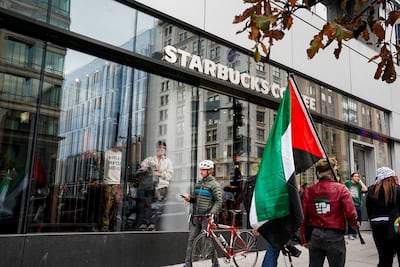
Brands such as Spiro Spathis, a fizzy drink founded in 1920 by one of the thousands of Greeks who made Egypt their home, have made a notable comeback after decades of limited distribution in a market dominated by Coca-Cola and Pepsi.
So much is the demand on Spiro Spathis that the company has advertised 2,000 new jobs on its social media.
“It's a golden opportunity to revive local industries that were weakened or died altogether in the 1980s,” said Negad Borai, a prominent rights lawyer and a member of the board of trustees of the “national dialogue”, an inclusive panel of experts, academics and politicians tasked by President Abdel Fattah El Sisi to chart Egypt's economic and political future.
“What's so special about the boycott movement, too, is that it's an effective grass roots movement launched away from government interference and is spontaneously growing,” he told The National.
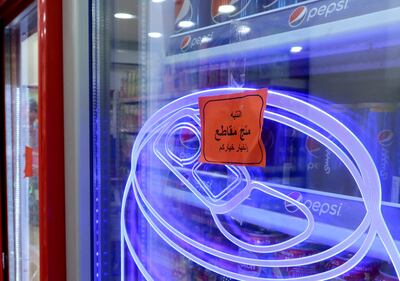
But the boycott across the Arab world is also raising questions on whether it could cost hundreds of thousands of jobs of those employed by local companies who own US and European franchises.
It's also raising questions on whether local franchise owners should be penalised for the perceived pro-Israeli policies of their mother companies.
Last month, people stormed several McDonald’s outlets across Lebanon, which shares a border with its long-time nemesis Israel. The protest did not take into account that the Lebanese franchise is not owned by the same company as the one in Israel, which announced free meals for Israeli soldiers.
In response to the controversy, the global fast food chain’s parent company last week rejected “inaccurate reports” over its position on the Gaza war.
“McDonald's Corporation is not funding or supporting any governments involved in this conflict, and any actions from our local development licensee business partners were made independently without McDonald's consent or approval,” it said.
A popular boycott of places like McDonald’s would devastate Lebanese supply chains. McDonald’s buys bread from Lebanese businesses, as well as chicken. It also employs around 1,400 Lebanese, according to Tony Nehme, a consultant and member of the Lebanese Franchise Association.
“The public needs to understand that boycott affects the Lebanese economy first and foremost before it affects anything else. The investors are Lebanese, the employees are Lebanese, the investment is money from Lebanon, and the supply chain is Lebanese.”
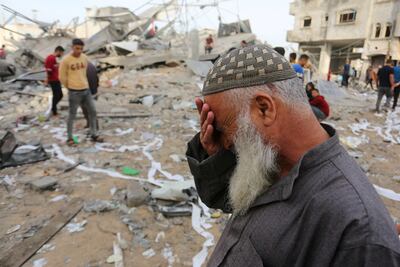
But Rami Salami of the Campaign to Boycott Supporters of Israel, Lebanon’s leading boycott campaign, explained that the issue goes beyond local economic consequences.
“Franchises in Lebanon should put pressure on the parent companies [that provide franchise licences]. It’s on them to find a solution to the problem – because simply put, they are tied to a company that supports Israel,” he told The National.
But Mr Borai, the Egyptian rights lawyer, believes boycotting McDonald's and Starbucks, regardless of the local consequences, affects only a small segment of the population in a country like Egypt.
“The loss of jobs will not be tragic either. Those who can fry chips and flip burgers can do that for local franchises,” he said.
In Jordan, the world's third-largest recipient of US aid after Israel and Egypt, some of the busiest McDonald's and Starbucks outlets in the capital Amman had a handful of people on Thursday night, usually the week's busiest time.
A large segment of Jordan's 10 million people are the second generation of Palestinian refugees who fled their homes to come to Jordan around the time Israel was created in 1948 and in the aftermath of the 1967 Arab-Israeli war when Israel captured the West Bank, Syria's Golan Heights and the Sinai Peninsula in Egypt.
Jordan in 1994 became the second Arab nation to sign a peace treaty with Israel after Egypt 15 years earlier.
Rana, a Jordanian mother of a teenage son, said she and her boy not only boycotted American brands but also French ones because of what she said was a rise in “French racism against Arabs” since the Gaza war began.
“We stopped going to Carrefour. We are buying local goods from a small grocery near the house,” said Rana.
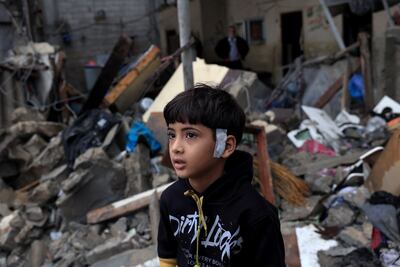
Many small supermarkets in Amman have stopped stocking Pepsi and Coca-Cola. Instead, they are offering a brand of fizzy drink called Matrix, which is manufactured in Jordan and Iraq.
One manager at a private company in Amman who ordered food and Coca-Cola Zero on the popular delivery app Talabat said she received Matrix instead of Coca-Cola.
“They did not tell me,” she said.
The boycott movement also speaks to anti-western sentiments sustained by decades of heavy-handed handling of the Palestinians by Israel and the West's perennial failure to get it to accept the will of the international community and give them an independent state of their own in the occupied West Bank and Gaza.
These sentiments were revived by the war in Gaza.
“I regret the years I lived while convinced that the West offered an example to follow when it comes to respect of human rights, justice and transparency,” said a prominent Egyptian artist whose paintings and installations earned her lavish accolades in Europe.
“Say what you will about us, but now I am convinced that we are the better people, the more civilised and compassionate.”
